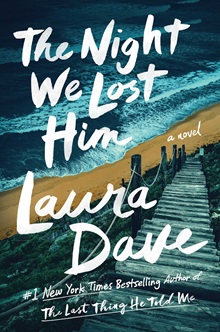A Q & A with Laura Dave on Her Latest Novel, The Night We Lost Him
Laura Dave is the #1 New York Times bestselling author of several novels, including The Last Thing He Told Me and Eight Hundred Grapes. Her novels have been translated into thirty-eight languages, and six of them, including The Night We Lost Him, have been optioned for film and television.

 Laura Dave is the #1 New York Times bestselling author of several novels, including The Last Thing He Told Me and Eight Hundred Grapes. Her novels have been translated into thirty-eight languages, and six of them, including The Night We Lost Him, have been optioned for film and television. She resides in Santa Monica, California.
Laura Dave is the #1 New York Times bestselling author of several novels, including The Last Thing He Told Me and Eight Hundred Grapes. Her novels have been translated into thirty-eight languages, and six of them, including The Night We Lost Him, have been optioned for film and television. She resides in Santa Monica, California.
In her latest novel, The Night We Lost Him, readers follow Nora, whose distant father, Liam Noone, was an exacting, self-made hotel magnate fleeing his past. He would forever remain distant to her after he fell to his death from his cliffside cottage perched on the California coast.
The authorities rule the death accidental, but Nora and her estranged brother Sam have other ideas. As Nora and Sam form an uneasy alliance to unravel the mystery, they start putting together the pieces of their father’s past and uncover a family secret that changes everything.
With Laura Dave’s trademark blend of soulful suspense and evocative family drama, The Night We Lost Him is a riveting page-turner with a heartbreaking final twist that readers will never see coming.
The Night We Lost Him, along with your other novels, can be called “soulful suspense.” Can you expand upon that term and what it means?
I love propulsive mysteries. And when I sat down to write The Last Thing He Told Me and The Night We Lost Him, I wanted to try and write suspense in a way where the answer wasn't rooted in good and evil, but rather in something more akin to love and grief. With those emotions at the fulcrum, I was less interested in excavating revenge or temporary justice, but rather leaning into how we step through tragedy and get to somewhere else. To somewhere better.
In both The Night We Lost Him and The Last Thing He Told Me, the protagonists must deal with the fall-out of family secrets emerging. What about this set-up is compelling to you?
I've always been interested in the secrets families keep from each other, but what I find interesting in The Night We Lost Him is that it also focuses on secrets we may not realize we are keeping from ourselves. There are heady ramifications when those secrets come to light, which is narratively a great place to be.
Your novels tend to take place in small towns. What entices you about these small towns?
I love towns that are not only small, but also on the edge of the world in some way. I think they require something paradoxical of their inhabitants—everyone is connected to each other and, at the same time, more anonymous. I like leaning into the different ways this can impact narrative—and lead my characters down surprising paths.
Each section of the book opens with a question about architecture. How did this become a central motif to the story?
My main character's profession is always central to how I understand her. Nora is a very specific kind of architect. She focuses on neuroarchitecture, which means her primary aim is to design buildings that will positively impact people's emotional and physical health. A person devoted to this discipline needs to have a keen sense of empathy, precision, patience, emotionality and intuitiveness—all traits that Nora utilizes in order to discover who killed her father.
The novel frequently shifts between past and present, particularly with flashbacks to Liam’s past. How did you develop each timeline? Were they created in-tandem, or did one come before (or even more easily!) than the other?
In many ways, the present storyline (which follows Nora) and the past storyline (which follows her father, Liam) were created in-tandem. The two storylines certainly were always in conversation with each other while I was writing. I loved getting to tell a love story over fifty years and to put clues throughout that timeline that Nora (and readers!) would find in the present. I thought of it as father and daughter writing letters to each other, the kind of big-hearted letters that ultimately led to their stories merging.
 In the novel, one character says: “Fidelity is who you tell your stories to.” What would you call what you do, as the storyteller?
In the novel, one character says: “Fidelity is who you tell your stories to.” What would you call what you do, as the storyteller?
I love this question! In The Night We Lost Him, the character means that to be truly faithful to someone, you must share yourself with that person. The good, the bad, the ugly. I was interested in the idea that this is one of the most crucial tenants of fidelity: that to know (and truly be known) is required for enduring love and commitment.
As to what this means in terms of being a novelist or a storyteller, I think it requires the same kind of allegiance to being open and truthful. Even in a fictional story, storytellers have a responsibility to always seek out the emotional truth—and let that guide how they move through a narrative.
The Night We Lost Him publishes on September 17, 2024.
SPONSORED BY
RELATED
ALREADY A SUBSCRIBER? LOG IN
We are currently offering this content for free. Sign up now to activate your personal profile, where you can save articles for future viewing










Add Comment :-
Comment Policy:
Comment should not be empty !!!